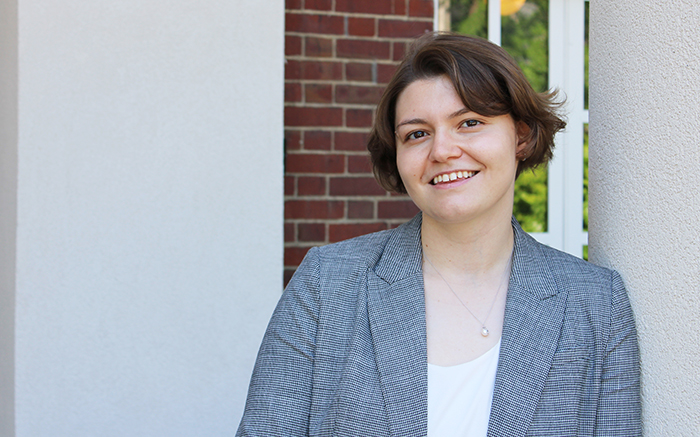
Mooting offers students opportunities to practice and improve oral advocacy skills in a simulated appellate court or arbitration, for course credit. For JD graduate Ema Ibrakovic, her early introduction to mooting is the reason why she chose to pursue a legal education at the University of Toronto’s Faculty of Law.
“I attended U of T’s Victoria College, for my undergraduate studies in Ethics, Society & Law and it was here that I first tried undergraduate mooting and started a team for it, doing a bunch of competitions.”
“That experience told me that I wanted to go to law school – I didn’t really know before that.”
Her interest in mooting only grew at U of T Law, where she coached fellow students, participated in upper-year competitive moots, and was a member of the Moot Court Committee, helping plan and execute the faculty’s student mooting program. She was also president of the Litigation Association at U of T – and has her sights set on a career as a litigator with an interest in criminal law.
“I was really obsessed with mooting,” laughs Ibrakovic, who also had the honour of being selected for the Grand Moot earlier this academic year. Four of the faculty’s top mooters presented Charter arguments in front of a panel of honourable Supreme Court Justices Andromache Karakatsanis (BA Victoria 1977), Mahmud Jamal (BA Trinity 1989) and retired Supreme Court Justice Rosalie Silberman Abella (LLB 1970, Hon. LLD 1990).
“Mooting is fundamentally a scary thing because it puts you on your feet, in uncomfortable situations where you don't know what you're going to be asked or demanded of you. Learning to embrace discomfort – and get excited about it – is something that applies not just to mooting, but especially when you're beginning your professional career, and everything is new to you.”
“Mooting has made me much more confident as a person – someone who wasn’t involved in any kind of public speaking before. I really thought it would be terrible when I did my first moot, and then fell in love with it quickly,” says Ibrakovic who will complete two clerkships, first at the Superior Court of Justice in Toronto, and then at the Court of Appeal for Ontario.
“It will be a chance to watch a lot of the advocacy, both written and oral.”
Ibrakovic has been recognized for her contributions to mooting as the recipient of this year’s Stephanie Fleur Couzin (JD 2009) Medal for Mooting, named after the late Fleur Couzin. The medal is awarded to a student who has demonstrated outstanding performance in the mooting program and a strong commitment as both a participant and coach.
But Ibrakovic’s leadership has distinguished her with yet another honour – this year’s JD class valedictorian. Nominated by one of her peers, she was chosen by the graduating class as someone who best exemplifies law school leadership and spirit.
“I’m very honoured. I was a little nervous when a friend told me they want to nominate me, but it at the same time, it was great. My parents are proud.”
As an active member of student governance, Ibrakovic has been a representative with Students' Law Society (SLS), its committees, wrote a guide to help law students navigate their first year – known as 1L – as well as coordinated a 1L tutoring program.
Her involvement as a teaching assistant at Toronto Metropolitan University’s Lincoln Alexander School of Law, led Ibrakovic to coordinate a peer mentorship program for the school’s first cohort.
“I essentially spearheaded a program where we connected Lincoln Alexander Law’s first year students to about 200 other upper year students across the province. It was really rewarding,” she says.
Ibrakovic says she will miss most the day-to-day interactions with her classmates.
“I hope that will happen again, at court, and throughout our careers. Law school is a nice little incubator – especially at U of T. People told me stories about how intimidating law school can be, but it couldn’t be further from the truth, in my experience.”
“Everyone pushes you to be your best because everybody around you is very impressive.”
Republished at U of T News

